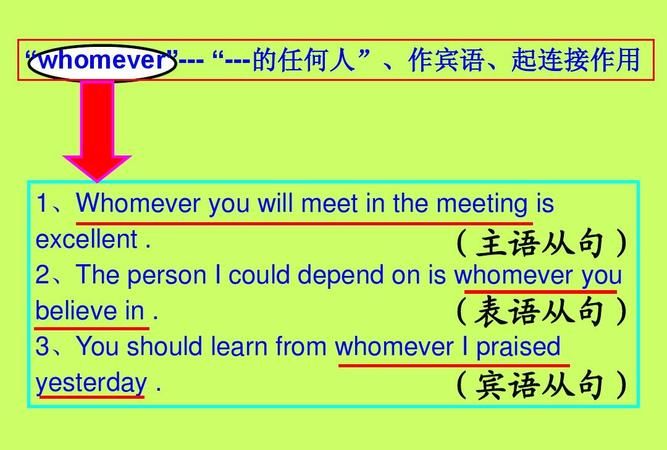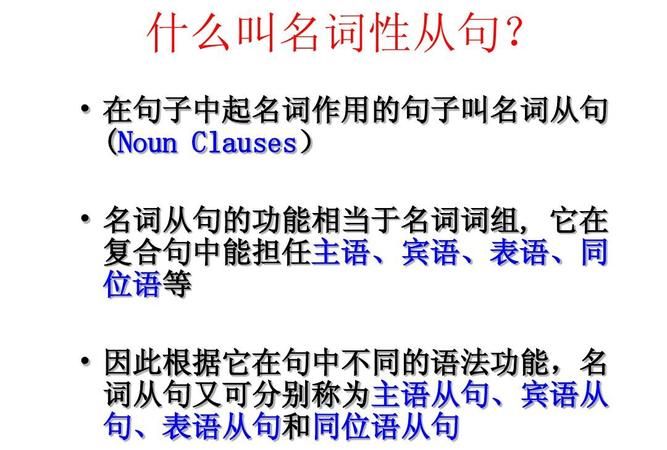本文目录
英语语法名词性从句思维导图
英语语法:名词性从句最详分析
名词性从句是由if, whether, that 和各种疑问词充当连接词所引导的从句,其功同名词一样。

一、主语从句
主语从句是在复合句中充当主语的从句,通常放在主句谓语动词之前或由形式主语it代替,而本身放在句子末尾。
1. It 作形式主语和it引导强调句的比较
It 作形式主语代替主语从句,主要是为了平衡句子结构,主语从句的连接词没有变化。而it引导的强调句则是对句子某一部分进行强调,无论强调的是什么成分,都可用连词that。被强调部分指人是也可用who/whom。例如:
It is a pity that you didn't go to see the film.
It doesn't interest me whether you succeed or not.
It is in the morning that the murder took place.
It is John that broke the window.
2. 用it 作形式主语的结构
(1) It is +名词+从句
It is a fact that …事实是…
It is an honor that…非常荣幸
It is common knowledge that…是常识
(2) it is +形容词+从句
It is natural that…很自然…
It is strange that…奇怪的是…
(3) it is +不及物动词+从句
It seems that…似乎…
It happened that…碰巧…
(4) it +过去分词+从句
It is reported that…据报道…
It has been proved that…已证实…
3. 主语从句不可位于句首的五种情况
(1) if 引导的主语从句不可居于复合句句首。
(2) It is said , (reported) …结构中的主语从句不可提前。例如:
It is said that President Jingo will visit our school next week. (right)
That President Jiang will visit our school next week is said. (wrong)
(3) It happens…, It occurs… 结构中的主语从句不可提前。例如:
It occurred to him that he failed in the examination. (right)
That he failed in the examination occurred to him. (wrong)
(4) It doesn't matter how/whether …结构中的主语从句不可提前。例如:
It doesn't matter whether he is wrong or not. (right)
Whether he is wrong or not doesn't matter. (wrong)
(5) 含主语从句的复合句是疑问句时,主语从句不可提前。例如:
Is it likely that it will rain in the evening? (right)
Is that will rain in the evening likely? (wrong)
4. What 与that 在引导主语从句时的区别
What 引导主语从句时在句时在从句中充当句子成分,如主语.宾语.表语,而that 则不然。例如:
1) What you said yesterday is right.
2) That she is still alive is a consolation.
二、宾语从句
宾语从句就是在复合句中作宾语的名词性从句,通常放在主句谓语动词(及物动词)或介词之后。
1. 作动词的宾语
(1) 由that引导的宾语从句(that 通常可以省略),例如:
I heard that be joined the army.
(2) 由what, whether (if) 引导的宾语从句,例如:
1) She did not know what had happened.
2) I wonder whether you can change this note for me.
(3) 动词+间接宾语+宾语从句。例如:
She told me that she would accept my invitation.
2. 作介词的宾语
例如:Our success depends upon how well we can cooperate with one another.
3. 作形容词的宾语
例如:I am afraid (that) I've made a mistake.
That 引导的从句常跟在下列形容词后作宾语:
Anxious, aware, certain, confident, convinced, determined, glad, proud, surprised, worried, sorry, thankful, ashamed, disappointed, annoyed, pleased, hurt, satisfied, content 等。也可以将此类词后的that 从句的看作原因状语从句。
4. It 可以作为形式宾语
It 不仅可以作为形式主语,还可以作为形式宾语而真正的宾语that 从句则放在句尾,特别是在带复合宾语的句子中。 例如:
We heard it that she would get married next month..
5. 后边不能直接跟that 从句的动词
这类动词有Allow, refuse, let, like, cause, force, admire, condemn, celebrate, dislike, love, help, take, forgive等。这类词后可以用不定式或动名词作宾语,但不可以用that引导的宾语从句。例如:
I admire their winning the match. (right)
I admire that they won the match. (wrong)
6. 不可用that从句作直接宾语的动词
有些动词不可用于“动词+间接宾语+that从句“结构中,常见的有Envy, order, accuse, refuse, impress, forgive, blame, denounce, advise, congratulate等。例如:
He impressed the manager as an honest man. (right)
He impressed the manager that he was an honest man. (wrong)
7. 否定的转移
若主句谓语动词为Think, consider, wuppose, believe, expect, fancy, guess, imagine等,其后的宾语从句若含有否定意义,一般要把否定词转移到主句谓语上,从句谓语用肯定式。例如:
I don't think this dress fits you well.(我认为这件衣服不适合你穿。)
三、表语从句
表语从句在复合句中作表语的名词性从句,表语是用来说明主语的身份、性质、品性、特征和状态的,表语常由名词、形容词、副词、介词短语、不定式、动词的-ing、从句来充当,它常位于系动词(be, become, appear, seem,look,sound,feel,get,smell等词)之后。
引导表语从句的词有连词that, whether,连接代词和连接副词,关系代词型what,以及as if, as though, because等连词。
1. 由that引导
The fact is that he doesn’t really try. 事实是他没有做真正的努力。
The trouble is that I have lost his address. 麻烦的是我把他的地址丢了。
My suggestion is that we should tell him. 我的建议是我们应该告诉他。
His sole requirement was (is) that the system work. 他唯一的要求是这个制度能起作用。
My idea is that we should start making preparations right now. 我的意见是我们马上就开始做准备工作。
【连词that的省略问题】
引导表语从句的that通常不省略,但在口语或非正式文体中有时也可省略:
My idea is (that) we should do it right away. 我的意见是我们应该马上干。
The trouble is (that) he is ill. 糟糕的是他病了。
2. 由whether引导
The question is whether the film is worth seeing. 问题是这部电影是否值得看。
【注意】whether 可引导表语从句,但与之同义的if却通常不用于引导表语从句。
3. 由连接代词引导
You are not who I thought you were. 你已不是我过去所想像的人。
The problem is who we can get to replace her. 问题是我们能找到谁去替换她呢。
The question is who (m) we should trust. 问题是我们应当相信谁。
What I want to know is which road we should take. 我想知道的是我们应走哪条路。
4. 由连接副词引导
The problem is how we can find him. 问题是我们如何找到他。
That was when I was fifteen. 这是我15岁时发生的事。
That’s where I first met her. 那就是我第一次遇见她的地方。
That’s why he didn’t come. 这就是他没有来的缘故。
That’s why I object to the plan. 这就是我反对这个计划的原因。
That’s where you are wrong. 这就是你不对的地方。
5. 由关系代词型what引导
That’s what I want to stress. 这是我想强调的。
That’s what we are here for. 我们来这里就为了这个。
Fame and personal gain is what they’re after. 他们追求的.是名利。
He is no longer what he was. 他已经不是以前的他了。
6. 由as if / as though引导
It isn’t as if you were going away for ever. 又不是你离开不回来了。
Now it was as though she had known Millie for years. 现在好像她认识米莉已有好多年了似的。
It is not as though we were poor. 又不是我们家里穷。
7. 由because引导
It is because I love you too much. 那是因为我太爱你了。
That’s because you can’t appreciate music. 这是因为你不能欣赏音乐。
If I’m a bit sleepy, it’s because I was upall night. 如果我有点困,是因为一夜没睡。
It's because I passed a slip of paper for John to Helen in class. 这是因为我在上课中替约翰传纸条给海伦。
【注意】because 可引导表语从句,但与之同义的since, as, for等也不用于引导表语从句。
四、同位语从句
同位语从句指的是在复合句中充当同位语的从句,属于名词性从句的范畴,同位语从句用来对其前面的抽象名词进行解释说明,被解释说明的词和同位语在逻辑上是主表关系。
引导同位语从句的词语通常有连词that,whether,连接代词和连接副词等。
1. 由that引导
We heard the news that our team had won. 我们听到消息说我们队赢了。
They were worried over the fact that you were sick. 他们为你生病发愁。
The news that we are having a holiday tomorrow is not true. 明天放假的消息不实。
I’ve come to the conclusion that it was unwise to do that. 我得出结论这样做是不明智的。
The fact that the money has gone does not mean it was stolen. 那笔钱不见了这一事实并不意味着是被偷了。
He referred to Copernicus’ statement that the earth moves round the sun. 他提到了哥白尼关于地球绕太阳转的说法。
【注意1】 在某些名词(如demand, wish, suggestion, resolution等)后面的同位语从句要用虚拟语气。 如:
They were faced with the demand that this tax be abolished. 他们面对废除这个税的要求。
They expressed the wish that she accept the award. 他们表示希望她接受这笔奖金。
There was a suggestion that Brown should be dropped from the team. 有一项建议是布朗应该离队。
The suggestion that the new rule be adopted came from the chairman. 采纳新规则的建议是主席提出的。
The resolution that women be allowed to join the society was carried. 允许妇女参加这个协会的决议通过了。
I can understand their eagerness that you should be the main speaker. 我理解他们希望你作主要发言人的殷切心情。
【注意2】 引导同位语从句的连词that通常不省略,但在非正式文体中也可以省去。 如:
He gabbed his suitcase and gave the impression he was boarding the Tokyo plane. 他拿起了手提箱,给人的印象是他要登上飞往东京的飞机了。
2. 由whether引导
There is some doubt whether he will come. 他是否会来还不一定。
Answer my question whether you are coming. 你回答我的问题:你来不来。
The question whether it is right or wrong depends on the result. 这个是对还是错要看结果。
We are not investigating the question whether he is trustworthy. 我们不是在调查他是否可以信任的问题。
【注意】 whether 可引导同位语从句,但if不能引导同位语从句。
3. 由连接代词引导
Have you any idea what time it starts? 你知道什么时候开始吗?
From 1985-90 I was an instructor at the regional party headquarters. After that I went back to work in a factory. Then I had no idea what a casino was. 从1985年到1990年我是地方党部的教员。随后我回到一家工厂工作。当时我不知道赌场是什么样的地方。
4. 由连接副词引导
I have no idea when he will come back. 我不知道他什么时候回来。
It is a question how he did it. 那是一个他如何做的问题。
He had no idea why she left. 他不知道她为什么离开。
You have no idea how worried I was! 你不知道我多着急!
【关于分离同位语从句】
有时同位语从句可以和同位的名词分开。 如:
The story goes that he beats his wife. 传说他打老婆。
The news got about that he had won a car in the lottery. 消息传开说他中彩得了一辆汽车。
The rumour spread that a new school would be built here. 谣传这里要盖一所新学校。
Report has it that the Smiths are leaving town. 有传言说史密斯一家要离开这座城市。
The thought came to him that maybe the enemy had fled the city. 他想到可能敌人已逃离这座城市。
The order soon came that all citizens should evacuate the village. 不久命令下来,所有居民都必须撤出村子。
;英语名词性从句思维导图
名词性从句,顾名思义,就是以名词作为先行词的从句(通俗地讲就是跟在名词后面的从句)。名词性从句包括主语从句、宾语从句、表语从句、同位语从句等具体的结构我会各用一个句子来形象表达:1)主语从句,以一个句子作主语,引导词用that/who/where/when/whether(具体用什么看它代指主句中的主语是什么了,指人用who指时间用when等等)例如:Who
will
come
is
unknown.2)宾语从句:宾语作先行词,引导词与1)中类似。例如:I
don't
like
the
girl
whose
brother
is
a
murder.3)表语从句:句子做表语(一般be动词link-v后接表语),例如:The
shop
is
where
I
bought
my
coat.4)同位语从句:句型:It
is
...that...例如:It
is
in
the
place
that
I
met
him
yesterday.

英语语法名词性从句思维导图
英语语法名词性从句
引导这些名词性从句的关联词包括:

从属连词that, if, whether;
连接代词who, whoever, whom, whomever, which, whichever, what, whatever, whose;
连接副词where, when, why, how。
其中, 从属连词只起连接作用, 在从句中不充当任何句法成分,而连接代词和连接副词既起连接作用, 在从句中又充当一定的成分.
That Owen should have married his cousin is not at all surprising. (主语从句)
The fact is that he didn’t go to the dinner party. (表语从句)
I don’t know if he will attend the meeting. (宾语从句)
Have you heard the news that Mary is going to marry Tom? (同位语从句)
你听说玛丽要和汤姆结婚的消息了吗?(that引导同位语从句)
[提示]
在含有主语从句的复合句中, 为保持句子平衡, 常用it作形式主语,而将真正的主语从句置于句末.
It’s well-known that water is indispensable to life.(形式主语)
2. 为保持句子平衡, that引导的宾语从句也常用it代替, 而将真正的.宾语从句置于主句句末。这常常出现在主句有形容词或分词作宾语补足语的情况下。
He made it quite clear that he preferred to live here.
3. 从属连词whether和if都作“是否…”解, 但if不可引导主语从句和表语从句。whether可与or(not)连用, 而if不可以。
I don’t know whether (if) she is at home. Whether she comes or not makes no difference.
4. that和what引导名词性从句的区别: that在从句中不充当成分,而what在从句中充当一定的成分, 如主语、表语、宾语等。that可省略, what则不可省。
He always means what he says. She suggested (that) he do it at once.
5. 同位语从句大多由从属连词that引导, 常跟在下列名词后面, 如fact, idea, opinion, news, hope, belief等, that不可省。同位语从句一般用来解释说明这些名词的具体含义和内容。
We are familiar with the idea that all matter consists of atoms.
The news that we are invited to the conference is very encouraging.
;英语名词性从句思维导图

以上就是关于名词性句子英语 ,英语语法名词性从句思维导图的全部内容,以及名词性句子英语 的相关内容,希望能够帮到您。
